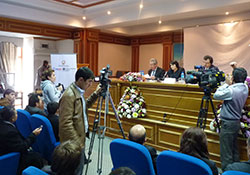Tajikistan launches plans to improve access to good health for people with disabilities

WHO
The Ministry of Health and Social Protection of Tajikistan has developed a disability and rehabilitation position paper that covers plans for a 6-year period from 2014 to 2019 titled “Better Health for Persons with Disabilities for an Inclusive Society in Tajikistan”. The vision of the position paper is a country where people with disabilities and their families enjoy the highest attainable standard of health, and the overall goal is to contribute to achieving health, well-being and human rights for persons with disabilities.
The position paper was launched at a press conference in Dushanbe, Tajikistan, on 3 December 2013.
The specific objectives outlined in the position paper are:
- to address barriers and improve access to health care services and programmes;
- to strengthen and extend rehabilitation services;
- to support the collection of appropriate data on disability, and promote multi-disciplinary research on disability.
Speaking at the press conference, Dr Pavel Ursu, WHO Representative in Tajikistan, noted that “Strengthening the health sector’s capacity to deliver better services to people with disabilities should improve the quality and equity of the population´s health status.”
Breaking down barriers
"The launch of this position paper on the eve of the International Day of Persons with Disabilities (3 December) underlines the Ministry´s obligations in relation to people with disabilities, who are the most disadvantaged and vulnerable groups of the population in any country, including in Tajikistan", said Dr Salimov, Minister of Health and Social Protection.
Good health is a prerequisite for participation in a wide range of activities including education and employment. However, evidence from around the world shows that persons with disabilities often have unequal access to health care services, unmet health care needs and experience poorer levels of health compared to the general population due to a range of attitudinal, physical and systemic barriers when they attempt to access health care. Many barriers, not only in health care but also related to education, employment, housing and transport, are avoidable and the disadvantage associated with disability can be overcome.



